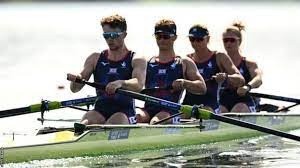

While his schoolmates were tackling hard on the rugby pitch or hitting sixes on the cricket field, Ed Fuller was left frustrated with the sport-mad youngster always knowing he would have to look for a different challenge.
Fuller has restricted movement in his ankles after being diagnosed with haemophilia, which affects the blood’s ability to clot, as a child. The 20-year-old is now a key part of the British Para-rowing set-up, a world and European champion in the mixed coxed four and one of the few elite Great Britain athletes with the condition across the Para-sport spectrum.
“When I was about two years old and on holiday with my family, I was walking along a low stone wall and fell off and hit my head and cut my ear,” Fuller tells BBC Sport.
“I had to go to A&E where they stitched it and glued it but it just wouldn’t stop bleeding and the doctors thought I might have some sort of bleeding disorder.
“My parents and brother and I were tested and we found out that my mum was a carrier for the haemophilia gene and I had it, although my brother doesn’t.
“It didn’t affect me too much in everyday life – and still doesn’t – but sport was where it set me apart and it stood out that I was different.”
With haemophilia, one of the clotting factor proteins important for blood clotting is either partly or completely missing.
People with haemophilia take longer than normal for bleeding to stop and can have bleeding into joints and muscles without having had an injury.
According to the Haemophilia Society, around one in 2,000 people in the United Kingdom have a diagnosed bleeding disorder.
Bleeds into his ankle joints when he was aged nine and 11 meant that Fuller had to use a wheelchair for a time to keep the pressure off his feet and although he tried hockey, swimming and cycling, it was rowing, which he had seen at the 2012 Olympics, which proved the perfect fit.
From the early beginnings of trying out a rowing machine at an after-school club to going out on the water with Exeter Rowing Club, Fuller found a sport which he could excel at and enjoyed victories at the prestigious National Schools’ Regatta.
Alongside his sporting successes, he had to deal with his condition, which requires him to inject medication into his arms every other day to help his blood clot, make him less likely to have bleeds and bruises and also reduce his pain – a process which wasn’t always easy for someone uncomfortable with needles.
“When I first started taking the medication, I was only a child and my mum was the one who injected me,” he says.
“But as I got older, it got to a point where she said that if I wanted to do rowing seriously and leave home and go to university, I would have to take some independence with my medication, so for me to do that was a big step forward for me.
“I’m quite fortunate in a way that my haemophilia is quite stable but there’s a lot of haemophiliacs in the country whose condition isn’t.”
The bleeds into his ankles have left Fuller with restricted mobility and strength. That means he is eligible for Para-rowing with adaptations including a special foot-plate in the boat, which enables him to use his power to the maximum.
He also has calf wastage and a smaller quad muscle in one leg but he works hard with the entire British Rowing team including coach Nicola Benavente and physio Pat Dunleavy to manage his condition.
“I can’t walk long distances and I can’t stand for long periods of time, which can be frustrating,” Fuller says.
“When I’m training, I spend a lot of time sitting down or I’m driving, which is fine, but I have to be careful when it comes to racing where I might spend more time on my feet.
“If I push my ankles too far it hurts to row and it creates tension which goes all the way up my leg and I’m not as good as an athlete as I could be, so it requires me to be switched on and manage my condition in the best way I can.
“That might mean doing my injections every day rather than every other day to help my ankles feel normal again.”
Fuller has slipped seamlessly into the GB rowing set-up, winning world gold in 2022 and European gold last month in a boat which has dominated the class in recent years, winning three Paralympic titles in a row and multiple world titles since their last defeat at the 2010 Worlds.
He will hope to be part of the boat’s world title defence in Serbia in September alongside crewmates Frankie Allen, Giedre Rakauskaite, Morgan Fice-Noyes and cox Erin Kennedy, who is back in the squad after treatment for breast cancer. Qualification for next year’s Paris Paralympics is also at stake in Belgrade.
He says that GB’s historic successes in the event does put pressure on him.
“The boat’s record is incredible, but it can be quite a big weight on the shoulders of an athlete, especially new athletes. It is both a blessing and a curse,” he says.
“It was close at the Europeans where we won by five seconds, which is still a win, but it’s a lot less than last year.
“It is definitely at the back on my mind that I don’t want to be in the boat that loses for the first time but I feel as athletes we just have to forget about it and race like any other race.
“Short term, I want to qualify the boat for the Paralympics, win the World Championships and then take gold in Paris next year.
“But as long as I’m long as I’m having fun and enjoying a sport that has given me so much, I’m happy.”
Source – BBC Sport